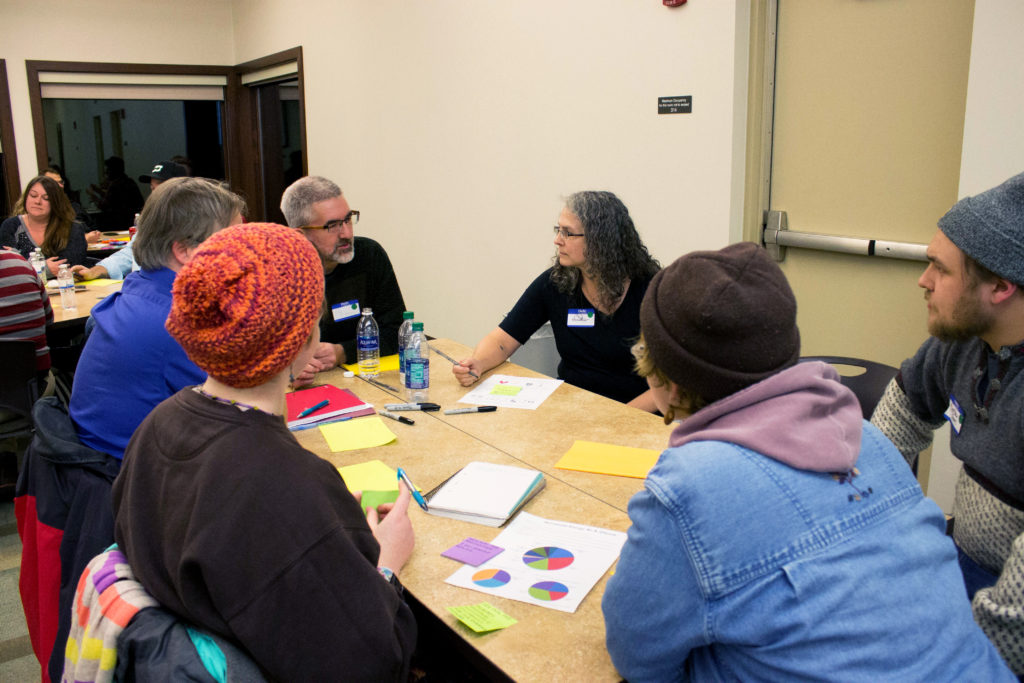On December 6, 2017, the Institute for Agriculture and Trade Policy and the Jefferson Center returned to Stevens County to help community members learn about the basics of the energy system, discuss energy goals, and brainstorm ways to achieve their goals. Mike Reese, Director of Renewable Energy at the West Central Research and Outreach Center, gave an “Energy 101” presentation. Brian Draxten, Director of Resource Planning at Otter Tail Power, discussed how the utility makes resource decisions and how they see the energy future. Finally, Blaine Hill, Morris City Manager, discussed the city’s efforts to make Morris climate-smart, as well as their expanding partnership with the city of Saerbeck, Germany.
After the presentations, participants broke up into small groups. Here’s what we heard:
What interests you or excites you about the future of our energy system?
- Possibility of generating most of our local power load with local resources
- Technological innovation is an opportunity for growth
- Rural communities making progress, leading the way
- Environmental safety
- Local production/resiliency
- Local ownership
- Seeing the already-existing motivation & excitement for our energy future
- We are building the momentum to move to more renewable energy sources
- A reduced reliance on carbon-emission producing energy sources means cleaner air
- There is enthusiasm for change
- There are local leaders who are working on change
- All residents (farm, rural, and town) can make improvements
- It’s exciting to me that we’re having this conversation
- I’m excited about the possibility of ending our dependence on fossil fuels
- The City is working on a sustainable future
- Community is interested in identifying the best path forward
- How many different idea there are in order to achieve a common goal – very uplifting
- Potential to use combination of locally-produced sources
- Lots of potential for renewable energies
- Thermal storage and thermal renewable
- Solar for residential users
- Wind
- Biomass
- Possibility for coordination
What concerns do you have about the way our energy system might change?
- Loss of local decision-making abilities/power
- Big businesses will try to own and control the system and it won’t meet our local needs
- Low income/small communities lacking (or unequal access to) authority
- Local people in Stevens County may not benefit from energy transition
- Concern about private ownership of power generation/transmission (similar to net neutrality)
- Utilities exercising preferences for large, centralized power generation
- The energy system will be the same model – owned by the utility
- Transition to renewables
- Not moving quickly enough to reduce carbon emissions by level necessary
- Energy availability may become less reliable
- Will federal financial (tax) incentives continue to be available for transition to renewables?
- Possible emphasis on biomass as a renewable source of energy, which might make it compete directly with food production and food security
- Limiting focus to one or a few solutions without considering the holistic effects they might have on our society and environment
- Either won’t build or will lose local jobs as a result of adopting renewables
- Initial cost – how can we make it affordable in the long run for everyone? If it isn’t affordable through a power company, there should be the opportunity for private ownership
- Possible imbalance in resources
- In an effort to reduce carbon emissions, we might start relying on nuclear energy
- We will stop the transition at some point because the economies will tip (natural gas prices spike)
- It might be ‘economy’ vs. ‘environment’
- Biased information might be presented as change happens
- Minnesota requires the Integrated Resource Plan to consider externalities – the Dakotas prohibit that
- Use of rare resources becoming contentious
- Technology improvements
- More centralized energy systems might make system more vulnerable to hacking, “Big Brother”/surveillance issues
- Life cycle of materials in new tech
- Electric vehicles
- Concern about the accuracy of the predictions of electric vehicle energy use
- Minnesota winter and need for all wheel drive might make it more difficult to transition to electric vehicles
- A big crease in electric demand from vehicles could be met by an increase in fossil fuel energy generation
- Grid/storage
- Energy security and storage
- Less compatibility between systems
- Transporting energy farther distances may leave areas more vulnerable to breaks in transport lines
- Lack of understanding about the system
- Ability of infrastructure to effectively utilize renewably-generated energy
- Total electrification of our energy will be a huge challenge
- Cost
- Possible price increases
- Fair rates for everyone – there may be more regional variability in access and cost
- We would buy or transport oil from Canadian tar sands to save money – that’s about the dirtiest energy on the planet!
- There may be animosity between groups over cost/availability (rural vs. city scenarios could be very different)
- Lifestyle
- It’s a challenge to get people to look at energy differently and change their habits to adapt to a new reality – of how we use energy and how we get energy. Everyone in the community needs to be educated on the costs of antiquated systems and the need for community involvement on this issue
- Minnesota winter and need for all wheel drive might make it more difficult to transition to electric vehicles
- Not enough people believe climate change is real, and those who do feel powerless
- We don’t pay attention to that which we replace (we generate waste)!
- We don’t pay attention to scarce resources
What do you think the Stevens County’s energy system should look like in 10 years?
- Locally-focused
- Locally owned/controlled
- Local folks benefit from the resources they provide
- Co-op/consumer-based/democratized solar
- Strengthens local economy
- Local autonomy but good relations with larger structure
- Local impacts/tradeoffs understood
- Local generation
- Over 50% locally-owned energy generating systems
- Looking to the residents of local communities as a resource
- Locally owned/controlled
- Efficient and electrified transportation
- Electric vehicles (cars & trucks)
- Charging stations around community (for example, at the grocery store)
- Driverless vehicles in perpetual motion, moving people between towns (public transportation)
- Bike lanes everywhere
- Shared cars/carpool system
- A network of electric vehicles for shared use, which would be more accessible than individually-owned electric vehicles
- $50 license fee for all SUVs owned within Stevens County limits
- $100 credit for energy-efficient vehicles driven by Stevens County residents
- Emphasis on walking
- Bring back the Morris à Twin Cities train
- Electric vehicles (cars & trucks)
- Energy comes from renewables
- 100% renewable energy for the county
- Sources
- Wind power
- Several wind farms
- Develop a 10 turbine wind farm nearby
- Solar power
- Community solar garden
- Solar garden on top of landfill with landfill gas-to-energy plant alongside
- Build a solar farm on edge of Morris/Stevens County
- Solar panels on roofs of businesses, homes
- Biomass at UM-Morris
- Diversity in sourcing energy makes the system more reliable
- Wind power
- Integration possibilities for agriculture and industry
- Utilizing intelligent efficiency technologies and methods
- Improve the grid/storage
- UM-Morris leading the way for energy (battery) storage system
- New power lines
- Energy back up/redundancy
- Integrated, islandable microgrid
- Capacity for growth
- More than one power source (flexible)
- Smart grid
- Partnership between the utility companies and the city/county to produce and maintain an affordable, low-pollution energy solution that benefits all environmentally and economically
- District heating
- District heating for as much of Morris as possible is a good idea
- System that extends beyond UMM
- Increase efficiency
- People know about and take advantage of energy audits
- Switch to LEDs
- Increased efficiency in library
- Super-insulated homes and businesses
- Much more conservation
- Efficient appliances
- Decreased business/municipal light use at night that is dark sky compliant
- Forward-looking policies
- PACE for residential buildings
- Utilize new technology in the long-term to reduce costs
- Commitment to renewable practices
- We have building codes that mandate energy efficient building, lighting, and heating/cooling
- Balanced energy policy to achieve goal of carbon reduction
- Increase in personal understanding of energy consumption
- Culture and behavior must shift to increase forward momentum of better energy policy
- People are mindful of their own consumption, and where the energy they use comes from
- Energy literacy is taught
- Education should begin in grade school
- Cost
- Inexpensive, or priced in relation to the true costs of energy generation
- Increased GDP from ‘tech transfer’
One thing that my neighbor should know:
- The cheapest kWh is the one you do not use
- We have potential for renewable sources of power generation here in Stevens County
- We’re farther along than people may think
- Wind is the cheapest energy that we can get!
- Owning our energy future is important
- UMM gets 60% of its electricity from 2 turbines
- We have lots of wind and solar – let’s use it!
- The idea of energy democracy is strong in our community
- Green energy is affordable, and becoming more affordable each year
- The conversation has started and progress is being made by collaboration between agriculture, rural folks, and industry
- Small size can be an advantage – we’re small enough where becoming energy self-sufficient is possible
- Rural communities embrace of renewable energy would support local economy, resilience
- There is excitement and leadership locally to make the necessary (and big) changes
- Utilities do not anticipate an increasing electric load for the next 10-15 years
- Energy use is leveling off at OtterTail
- The difference between Germany/Stevens County isn’t in landscape/resources but in how energy is produced/used; in Germany, more biking and walking, less energy use
- I already knew a fair amount about this topic, but now I have better insight into OtterTail’s perspective
- Changes happening at OtterTail that create a mix of power generation
- Everyone sees the world around them differently – people genuinely want to make a difference but their solutions differ
- Our local government is working toward a sustainable future



